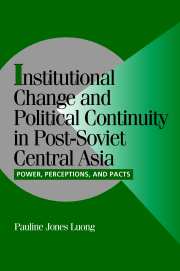 Institutional Change and Political Continuity in Post-Soviet Central Asia
Institutional Change and Political Continuity in Post-Soviet Central Asia Book contents
- Frontmatter
- Contents
- Tables and Figures
- Note on Transliteration
- Acronyms
- Acknowledgments
- 1 THE CONTINUITY OF CHANGE: OLD FORMULAS AND NEW INSTITUTIONS
- 2 EXPLAINING INSTITUTIONAL DESIGN IN TRANSITIONAL STATES: BEYOND STRUCTURE VERSUS AGENCY
- 3 SOURCES OF CONTINUITY: THE SOVIET LEGACY IN CENTRAL ASIA
- 4 SOURCES OF CHANGE: THE TRANSITIONAL CONTEXT IN CENTRAL ASIA
- 5 ESTABLISHING AN ELECTORAL SYSTEM IN KYRGYZSTAN: RISE OF THE REGIONS
- 6 ESTABLISHING AN ELECTORAL SYSTEM IN UZBEKISTAN: REVENGE OF THE CENTER
- 7 ESTABLISHING AN ELECTORAL SYSTEM IN KAZAKHSTAN: THE CENTER'S RISE AND THE REGIONS' REVENGE
- 8 INSTITUTIONAL CHANGE THROUGH CONTINUITY: SHIFTING POWER AND PROSPECTS FOR DEMOCRACY
- Appendix I Sample Interview Questions
- Appendix II Career Patterns of Regional Leaders in Soviet and Post-Soviet Central Asia
- References
- Index
2 - EXPLAINING INSTITUTIONAL DESIGN IN TRANSITIONAL STATES: BEYOND STRUCTURE VERSUS AGENCY
Published online by Cambridge University Press: 02 September 2009
- Frontmatter
- Contents
- Tables and Figures
- Note on Transliteration
- Acronyms
- Acknowledgments
- 1 THE CONTINUITY OF CHANGE: OLD FORMULAS AND NEW INSTITUTIONS
- 2 EXPLAINING INSTITUTIONAL DESIGN IN TRANSITIONAL STATES: BEYOND STRUCTURE VERSUS AGENCY
- 3 SOURCES OF CONTINUITY: THE SOVIET LEGACY IN CENTRAL ASIA
- 4 SOURCES OF CHANGE: THE TRANSITIONAL CONTEXT IN CENTRAL ASIA
- 5 ESTABLISHING AN ELECTORAL SYSTEM IN KYRGYZSTAN: RISE OF THE REGIONS
- 6 ESTABLISHING AN ELECTORAL SYSTEM IN UZBEKISTAN: REVENGE OF THE CENTER
- 7 ESTABLISHING AN ELECTORAL SYSTEM IN KAZAKHSTAN: THE CENTER'S RISE AND THE REGIONS' REVENGE
- 8 INSTITUTIONAL CHANGE THROUGH CONTINUITY: SHIFTING POWER AND PROSPECTS FOR DEMOCRACY
- Appendix I Sample Interview Questions
- Appendix II Career Patterns of Regional Leaders in Soviet and Post-Soviet Central Asia
- References
- Index
Summary
The establishment of electoral systems in Kazakhstan, Kyrgyzstan, and Uzbekistan presents both a complex set of empirical puzzles and a theoretical challenge. Why did three states with similar cultural, historical, and structural legacies establish such different electoral systems? How did these distinct outcomes result from such strikingly similar institutional design processes? What accounts for the similarities in the process by which they each designed new electoral rules – in particular, the common salience of regionalism – and yet, the divergent forms that electoral systems took as a result of this process? Explaining these puzzles requires understanding not only the outcome of institutional design but also the intricacies of the process that lead to this outcome. Moreover, the transitional context in which these three states designed new electoral rules necessitates an approach that explicitly links the institutional design process and its outcome in a dynamic setting.
This chapter provides such an approach. In short, I depict institutional design as a transitional bargaining game (TBG) in which the dynamic interaction between the structural-historical context and the immediate-strategic context directly shapes actors' perceptions of shifts in their relative power as the game proceeds, and hence, their bargaining strategies. I thus offer an approach that builds on the key insights of the dominant approaches to explaining institutional origin and change, and yet, also transcends these approaches by moving beyond the structure versus agency debate that forms the basis for the intellectual divide between them.
Information
- Type
- Chapter
- Information
- Institutional Change and Political Continuity in Post-Soviet Central AsiaPower, Perceptions, and Pacts, pp. 25 - 50Publisher: Cambridge University PressPrint publication year: 2002